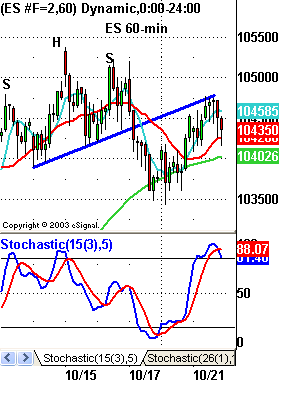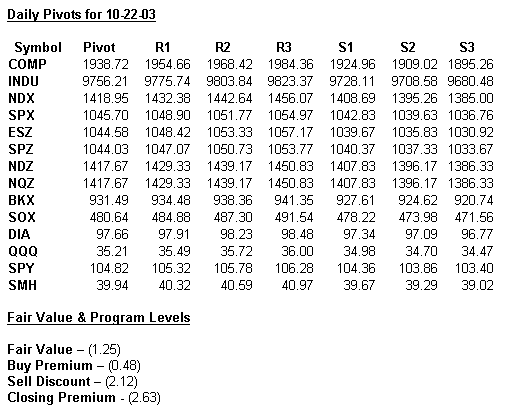Let’s Talk About Trading Slumps
The December S&P 500
futures (SPZ and ESZ) opened Tuesday’s session with a -1.75 point gap
to the downside amid some disappointing earnings reports from the Telecom
sector. The futures saw some weakness continuation off the open, allowing for a
quick TICK fade entry, but a couple of failed attempts to break the Daily Pivot
at 1,041.50 forced enough short-covering to close the opening gap. Price did a
U-turn again for another test of the Pivot, and found some support there
again. The subsequent buying pushed the contract through Monday’s high to post
the session high. The next 3 hours were a true test of discipline as the futures
chopped in a 1-2 point range and then failed to take their recent usual cue from
the positive bond market close.
The December S&P 500 futures closed Tuesday’s
session with a loss of -1.75 points and finished in the lower 1/2 of its daily
range. Volume in the ES was estimated at 572,000 contracts, which was ahead of
Monday’s pace, but still below the daily average. On a daily basis, the
contract posted a doji and settled right on its 10-day MA. On an intraday
basis, the 60-min chart retraced to test the broken trend line and
head-and-shoulders neckline, only to be turned away and settle on 15-MA support
(see chart).

At the time of this writing, positive earnings
reports from AMGN and AMZN had failed to paint a rosy enough picture for traders
to play the long side. On Wednesday morning, look for reports from DD, EK, LLY,
GSK, LLL, LU, MRK, PFE, and Banking Index (BKX) component JPM.
Trading Slumps
There are two kinds of traders: Those who have
experienced a trading slump, and those who will. Any experienced trader who says
he’s never been through a slump is a liar. The majority of good traders have
gone through flat periods at some point in their career. Many slumps have a
psychological reason behind them. Your belief and confidence in yourself are
going to be your main tools in pulling yourself out of a slump.
Let’s say you’ve found a trading method that
works for you. You’ve also developed good money management rules. Everything is
in place, yet you find yourself still not pulling the trigger. You still don’t
feel comfortable following your rules, you have trouble exiting losing trades,
and in general, you’ve lost your “rhythm” with the market.
What’s missing? The psychological part of trading
is the most important, yet that is the side that people spend the least time
on. How many people are willing to admit that the battleground isn’t the market
itself, but what’s going on inside them? The more you talk with other traders,
the more you’ll learn that they all go through common experiences.
Speaking personally, most traders have run the
gamut through all the classic mistakes, and back again. But what distinguishes
those who can overcome them? The markets are an exciting game, but at the same
time, they are also emotionally, and sometimes physically challenging. The
mental side can be summed up as 1/3 beliefs, 1/3 concentration, and 1/3 managing
the stress. Learn how to deal with distractions, because they’re going to be
present almost every single day. You will have more confidence if you’re
following a defined method.
You must feel like you’re making the right play,
rather than worrying about the outcome. It’s OK to make the right play and not
have the trade work out. Don’t worry if the price goes a little bit higher after
you sell it. I always say to treat trading mistakes like cheating on a
diet.There is nothing you can do to undo the damage except get back to
exercising to work it off. Stress impairs your judgment, so learn to recognize
when your thinking is being clouded by stress. Your mental state outside market
hours will affect your decision-making ability during market hours.
A person can have all the knowledge in the world,
but if he doesn’t have the presence of mind to handle a stressful situation,
where does that knowledge go? Straight out the window. It’s easier to be
flexible and change your mind when you’re relaxed. If you’re all tensed up, it
blocks the flow of thought. Unfortunately, human beings are creatures of
emotion. Intelligence with regards to trading is not about knowing the names of
every company in the S&P 500, but more about reacting the right way under
pressure and making the right decisions when they need to be made.
Experience is learning how to recognize your
mistakes when you make them. However, speaking personally again, experience
doesn’t always keep you from making the same mistakes. Quit thinking about ways
you can lose money. It’s better to put the trade on and assume some risk than it
is not to try at all. Once you’ve made it back after a drawdown, your
confidence will triple. You will quickly get a “feel” for the market when you
have a trade on. However, you’re always going to be the most objective when you
don’t have a trade on. Funny how that works.

If any of this has struck home or if you have
stories to share, please feel free to email me. Have a great trading day on
Tuesday!
chrisc@tradingmarkets.com
